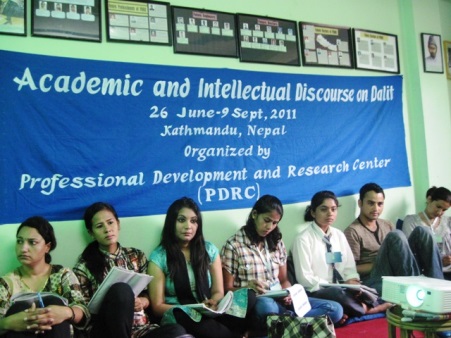The graduates of 1st batch of PDRC’s “Academic and Intellectual Discourse on Dalit” are awarded with the certificate of participation on February 10th, 2012 in Kathmandu. This course was started from June 26th to September 9th, 2011 with energetic youths representing diverse educational backgrounds as law, sociology, social work, social science, management, and health. This program mainly aims at generating youth leaders from across dividing lines to build up their leadership skills and sensitizes them with the issues related to Dalits.
PDRC’s Academic and Intellectual Discourse on Dalit is a three months program empowering youths to understand about Dalit issues. They go through a series of classes and readings on law, history, politics, education, social inclusion, economics, gender, media, development, research methodology, and human rights among others. They are also introduced to the research tools and this course is further followed by thematic research. This has been effective for their leadership development and also build a network with fellow graduates including the scholars.
The session in the course was delivered by eminent personalities like Dr. Bidhyanath Koirala, Dr. Krishna Bhattachan, Bishwabhakta Dulal “Ahuti”, Dr. Man Bahadur B K, Hira Bishwakarma, Purna Nepali, Yam Kisan, Dhan Kumari Sunar and Babu Ram Bishwakarma. Similarly, Dr. Jagdishchandra Pokharel, Dipendra Bahadur Kshetry, Krishna Khanal, Kundan Aryal contributed in the course as a guest speaker. Dr. Drona P. Rasali spoke with the participants over Skype from Canada.
The graduates not only learned from the resource persons but also widened their knowledge about diverse fields. Shovha Bimali, a participant shares her experience as “I was born in a Brahmin family and I saw my parents treating Dalits badly in the neighborhood. This led me to pose the question of how this system came into existence and this course seems to have answered my questions. More than that, it instigated a hunger in me.” For Sujan Kumari Bardewa, this course helped her to decide to get into the decision-making body of the state mechanism.”
